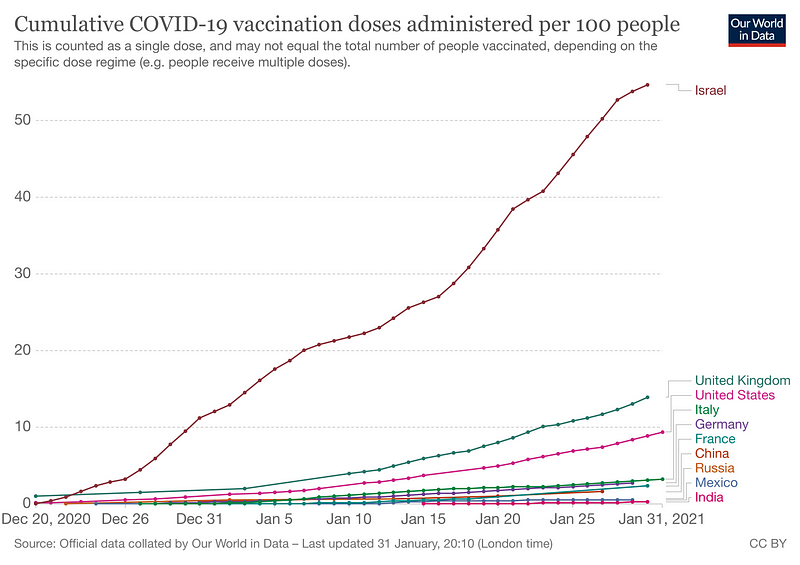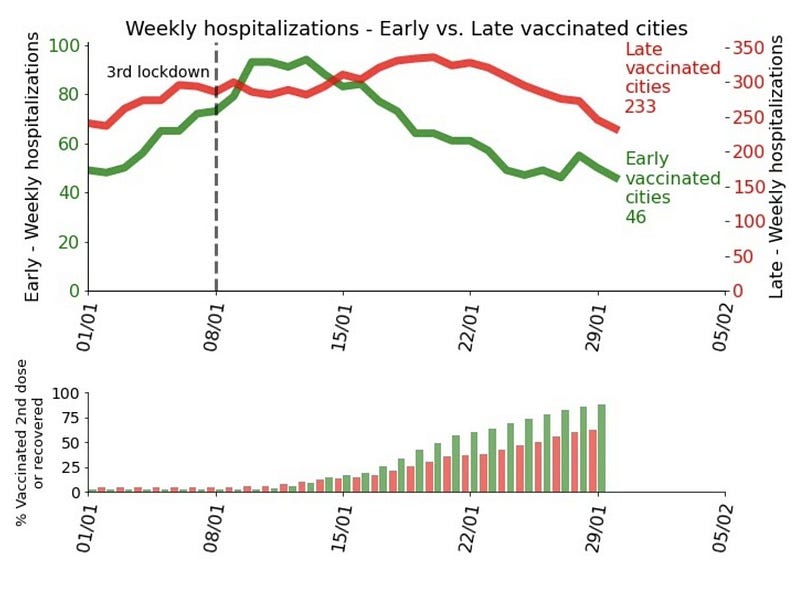Positive Developments on Pfizer’s COVID-19 Vaccine Emerge
Written on
Chapter 1: An Optimistic Outlook on Vaccination
Recent data from leading vaccination nations presents a hopeful perspective on the outcomes of the second dose of the Pfizer vaccine.

Photo by L N on Unsplash
Approximately 100 million individuals have received a COVID-19 vaccine in real-world scenarios, and while numerous questions remain, the unfolding knowledge is intriguing and, so far, encouraging.
Israel stands out as a prime source for vaccine-related insights, having successfully vaccinated over a third of its population of fewer than 10 million. The nation excels in vaccination rates and maintains an up-to-date, detailed record of all COVID-19 statistics on the Ministry of Health's official website.

Israel has achieved a vaccination rate of 34% among its population. Photo: OurWorldInData
On January 13, I reported initial findings from Israel’s private health services, which indicated strong efficacy following the first dose of the Pfizer-BioNTech vaccine.
There’s Positive News Regarding Pfizer’s COVID-19 Vaccine
Studies from the top vaccination country provide fresh reasons for optimism.
Two and a half weeks later, over 1.7 million Israelis had received their second dose, and early data on the impacts of full vaccination—defined as being at least a week post-second dose—began to surface. Here are some key statistics from the Israeli Ministry of Health:
For those aged 60 and older: Data was gathered from 668,100 fully vaccinated individuals, revealing: - 473 tested positive for COVID-19 (0.07%). - 38 were hospitalized. - 11 were in serious condition. - 3 were critically ill. - 2 succumbed to the virus.
When comparing fully vaccinated individuals over 60 to their unvaccinated counterparts (either with no doses or just the first dose), there was an observed 83% reduction in positive cases.
The rates of cases, hospitalizations, severe illness, and fatalities for fully vaccinated individuals were significantly lower than those for unvaccinated individuals within the same age group.
For those under 60 years old: Data from 325,301 fully vaccinated individuals showed: - 231 tested positive for COVID-19 (0.071%). - 1 was in serious condition. - 2 were critically ill. - There were no reported deaths.
Conversely, in an unvaccinated group of under-60s, the positive case rate stood at 0.57%.
"This data is very promising," stated Dr. Galit Kaufman from Maccabi Health Services in an interview with Israeli Channel 12 news. She also referenced another study conducted by Maccabi Health Services that yielded similarly encouraging results.
In this additional study, data from 250,000 fully vaccinated individuals was assessed, with only 66 confirmed COVID-19 cases occurring between seven to 18 days after the second dose. Most of those affected were over 55 years old, with half having pre-existing health conditions, and the majority experienced mild symptoms.
The vaccine's positive impact can also be analyzed through a study comparing cities with early vaccination (where at least 85% of those aged 60 and over were vaccinated by January 10) to those with late vaccination (where under 70% of those aged 60 and over were vaccinated).
The analysis revealed a decrease in cases and hospitalization rates among those aged 60 and older in early-vaccinated cities compared to their counterparts in late-vaccinated cities. Similar trends were observed when comparing older vaccinated individuals to younger groups aged 40-60, who had lower vaccination rates at the time.

Early-vaccinated cities reported fewer COVID-19 cases and severe illnesses. Photo: Prof. Eran Segal
What Do These Findings Indicate?
It's crucial to understand that these figures are preliminary, and further research is necessary. Additionally, as time progresses, there could be an increase in infections among fully vaccinated individuals. It's also worth noting that Israel is currently undergoing its third lockdown, which may influence the data.
Nevertheless, the data suggests that fully vaccinated individuals are significantly less likely to contract COVID-19. Whether this is because they are not getting infected or are simply asymptomatic and therefore not tested remains uncertain.
Encouragingly, if a fully vaccinated person does contract the virus, the likelihood of experiencing severe illness or death appears to be minimal. While many questions remain unanswered, the emerging data is promising. Vaccines seem effective on a broad scale and play a crucial role in combating the pandemic. Although it's early to make definitive claims, any good news is certainly welcome.
Chapter 2: Key Insights from Recent Studies
The first video titled "Good news about Pfizer's COVID-19 vaccine and teens" discusses the latest findings regarding vaccine effectiveness among younger populations.
The second video titled "FDA approves updated Covid-19 vaccines" provides updates on the newly authorized vaccines and their implications.